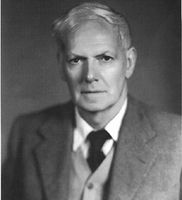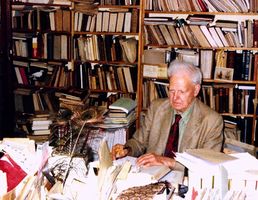Bailey, H.: Difference between revisions
m (1 revision imported) |
m (Text replacement - "{{Footer}}" to "") |
||
| (10 intermediate revisions by 2 users not shown) | |||
| Line 1: | Line 1: | ||
{{Person | {{Person | ||
| | |HasDrlPage=Yes | ||
|HasLibPage=Yes | |||
|HasBnwPage=Yes | |||
|pagename=Bailey, H. | |pagename=Bailey, H. | ||
| | |PersonType=Authors of English Works | ||
|images=File:Bailey harold.jpg | |||
File:Bailey Harold W.jpg | |||
|MainNamePhon=Harold Walter Bailey | |||
|namefirst=Harold | |||
|namemiddle=Walter | |||
|namelast=Bailey | |namelast=Bailey | ||
| | |yearbirth=1899 | ||
| | |yeardeath=1996 | ||
|bornin=Devizes, Wiltshire, England | |||
|bio=Sir Harold Walter Bailey, FBA (16 December 1899–11 January 1996), who published as H. W. Bailey, was an eminent English scholar of Khotanese, Sanskrit, and the comparative study of Iranian languages. | |||
Bailey has been described as one of the greatest Orientalists of the twentieth century. He was said to read more than 50 languages. | |||
In 1929 Bailey began his doctoral dissertation, a translation with notes of the ''Greater Bundahishn'', a compendium of Zoroastrian writings in Middle Persian recorded in the Pahlavi scripts. He became the world's leading expert in the Khotanese dialect of the Saka language, the mediaeval Iranian language of the Kingdom of Khotan (modern Xinjiang). His initial motivation for the study of Khotanese was an interest in the possible connection with the ''Bundahishn''. He later passed his material on that work to Kaj Barr. | |||
He was known for his immensely erudite lectures, and once confessed: "I have talked for ten and a half hours on the problem of one word without approaching the further problem of its meaning." | |||
Bailey was elected a Fellow of the British Academy in 1944, and subsequently a member of the Danish, Norwegian and Swedish Academies. He received honorary degrees from four universities including Oxford; served as president of Philological Society, the Royal Asiatic Society, the Society for Afghan Studies, and the Society of Mithraic Studies; and chaired the Anglo-Iranian Society and Ancient India and Iran Trust. He was knighted for services to Oriental studies in 1960. ([https://en.wikipedia.org/wiki/Harold_Walter_Bailey Source Accessed Dec 6, 2019]) | |||
See complete biography in [http://www.iranicaonline.org/articles/bailey-harold-walter-1 Encyclopædia Iranica] | |||
|publications=* ''Codices khotanenses'', Copenhagen: Levin & Munksgaard, 1938. | |||
* ''Zoroastrian Problems in the Ninth-Century Books'', Oxford: The Clarendon Press, 1943. | |||
* ''Khotanese Texts, Cambridge: The University Press, 1945. | |||
* ''Khotanese Buddhist Texts, London: Taylor's Foreign Press, 1951. | |||
* ''Sad-dharma-puṇḍarīka-sūtra'' [The summary in Khotan Saka by], Canberra: Australian National University, Faculty of Asian Studies, 1971. | |||
* ''Dictionary of Khotan Saka''. Cambridge: Cambridge University Press, 1979. | |||
* ''The Culture of the Sakas in Ancient Iranian Khotan'', Delmar, N.Y.: Caravan Books, 1982. | |||
|IsInGyatsa=No | |||
|classification=People | |||
|pagecreationdate=24 August 2016 | |pagecreationdate=24 August 2016 | ||
}} | }} | ||
Latest revision as of 14:26, 5 June 2024
| PersonType | Category:Authors of English Works |
|---|---|
| FirstName / namefirst | Harold |
| LastName / namelast | Bailey |
| namemiddle | Walter |
| MainNamePhon | Harold Walter Bailey |
| bio | Sir Harold Walter Bailey, FBA (16 December 1899–11 January 1996), who published as H. W. Bailey, was an eminent English scholar of Khotanese, Sanskrit, and the comparative study of Iranian languages.
Bailey has been described as one of the greatest Orientalists of the twentieth century. He was said to read more than 50 languages. In 1929 Bailey began his doctoral dissertation, a translation with notes of the Greater Bundahishn, a compendium of Zoroastrian writings in Middle Persian recorded in the Pahlavi scripts. He became the world's leading expert in the Khotanese dialect of the Saka language, the mediaeval Iranian language of the Kingdom of Khotan (modern Xinjiang). His initial motivation for the study of Khotanese was an interest in the possible connection with the Bundahishn. He later passed his material on that work to Kaj Barr. He was known for his immensely erudite lectures, and once confessed: "I have talked for ten and a half hours on the problem of one word without approaching the further problem of its meaning." Bailey was elected a Fellow of the British Academy in 1944, and subsequently a member of the Danish, Norwegian and Swedish Academies. He received honorary degrees from four universities including Oxford; served as president of Philological Society, the Royal Asiatic Society, the Society for Afghan Studies, and the Society of Mithraic Studies; and chaired the Anglo-Iranian Society and Ancient India and Iran Trust. He was knighted for services to Oriental studies in 1960. (Source Accessed Dec 6, 2019) See complete biography in Encyclopædia Iranica |
| YearBirth | 1899 |
| YearDeath | 1996 |
| BornIn | Devizes, Wiltshire, England |
| publications |
|
| IsInGyatsa | No |
| Other wikis |
If the page does not yet exist on the remote wiki, you can paste the tag |


